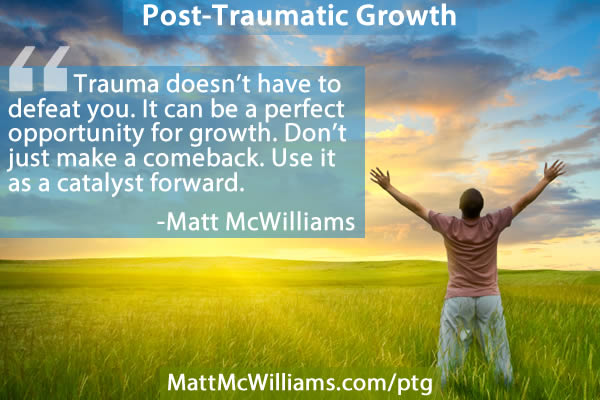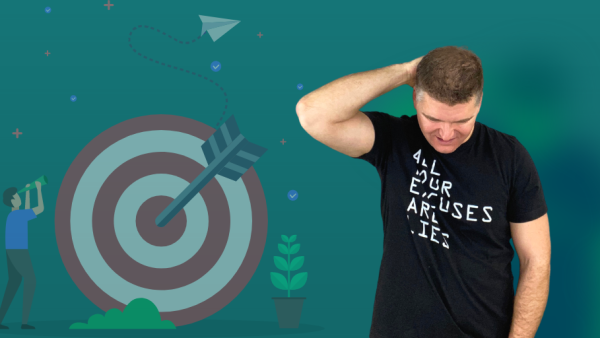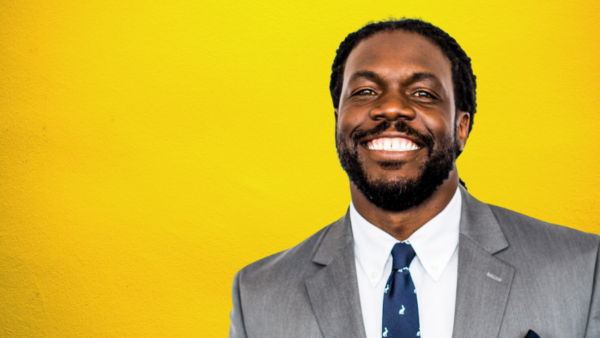Imagine for a moment that you are twenty-two years old, your entire life in front of you…and you’re headed for combat. Maybe that’s not hard to imagine. You’ve been that kid headed off to war, scared out of your mind, not knowing what lies ahead. Most of us haven’t and we salute you for your service.

Before you go, you meet with a psychologist. It’s normal to do so. Their job is to prepare you for the horrors you’re about to face and, eventually, the return home. The psychologist tells you that when you return, there are only two options:
1. Return “normal.”
2. Return with Post-Traumatic Stress Disorder.
This well-intentioned psychologist has pigeon-holed this impressionable kid into forming only two paths in his mental map, average and bad.
We do the same things to ourselves.
Maybe you go through a divorce and figure that your kids will turn out one of two ways: OK and generally unaffected or they will rebel and be just like the millions of other statistics.
Or you face an unexpected and devastating job loss and can’t even imagine finding a better one. Your two options are “just get back on our feet” or live off the government.
Like millions of men and women every year, you are diagnosed with cancer. “Normalcy” no longer seems possible. You can hardly keep count of the scars this is going to leave, physically and emotionally.
But what about the third option?
There is a third road on our mental map. It’s a road that requires us to use our imagination and ignore our negative voices, though. (Ironically, the worst-case scenario also requires us to use our imagination. “Normal” is easy to picture. We’ve lived it. Viewing ourselves as possibly having PTSD, though, requires us to visualize something that is not yet reality.)
That third road is called:
Post-Traumatic Growth
I’d never heard of this term until recently. Odds are, neither have you.
The reason for that is that while we’ve instinctively known difficult circumstances can lead to personal growth, we’ve only recently been able to prove it scientifically. Only in the past twenty-five years have psychologists like Richard Tedeschi systematically proven that an intense struggle, challenge, or life-altering difficulty can lead to positive change. Prior to his studies, which only began in the 1980’s, we relied entirely on anecdotal evidence (“What doesn’t kill you makes you stronger.” Just look at my friend Joe or that famous person in the movies.)
What can trauma do for us?
Tedeschi’s research shows that traumatic events or struggles often lead to:
- Increased spirituality
- Closer relationships
- Greater openness with others
- More compassion for others
- Greater confidence
- Increase in personal strength
In other words, life is better. Instead of just using the setback as a setup for a comeback, they use it as a catalyst to propel forward.
But not everyone reacts this way. Why?
Post-Traumatic Stress Disorder is a real thing. Personally, I cannot even imagine the horrors of seeing a friend’s body blown to pieces, dealing with the pain to my own body from an explosion, or knowing that something I did was responsible for killing civilians. And while, I cannot put myself in their shoes or the shoes of a cancer patient, I do know struggle. And I know both responses, good and bad. I’ve done both.
So what separates those who grow from those who only wish for a return to normal?
In a word: Mindset.
There are four steps to using difficulties for growth rather than a lifetime of misery.
The 4 Steps to Post Traumatic Growth
1. Interpretation
Growth comes from the same place that negativity, helplessness, and quitting come from: How we interpret what happened to us. I touched on this before when I explained how to change your counterfacts.
Is this a positive or a negative event? This is the part that requires the right kind of imagination. Your mind will take you down one of three roads if you let it. It’s up to you to steer it.
I highly suggest you read this post for more on the subject.
2. Tackling the problem head on
The second factor they found in those who grew from trauma was that they tackle the problem head on. They didn’t deny the problem. They didn’t minimize it. They didn’t avoid it.
They identified the problem and did everything they could to address it.
3. They sought help
Often, the biggest part of tackling it head on is seeking help from others. Those who overcame life-altering problems weren’t the ones who holed themselves up in a room and battled it alone. They had a team.
You’ll need everyone you can get. God, family, friends, mentors, and spiritual leaders. Rally a team around you, lean on them when you need to cry. Allow them to encourage you and support you.
Studies show that there is a direct correlation between recovery/growth from a setback and the quantity and quality of their relationships.
4. Optimism for the future
This is another area that requires imagination. You’ve identified the positive that can come out of the event, you’ve tackled it head on, and you’ve got a great support team in place. Good.
Now…it’s time to look to the future in a positive light. The job loss will get you out of your comfort zone so you can finally start that business you’ve dreamed about. The cancer led to your children moving closer. Now you get years to play with your grandkids. After the divorce, you and your kids are going to grow even closer together. Picture what those things look like. Smile.
You may never know the horrors of war, but life can feel like it sometimes. You will be set back at times.
But you will choose to grow. When life punches you in the throat, follow these four steps…and that third road will lead to a beautiful place.
How have you grown as the result of a trauma?
Questions?
Text me anytime at (260) 217-4619.
Or…check out some of my free reports to help you get on the right track:
 |
 |
 |
 |
 |
 |
 |
 |
 |








All true growth comes from suffering. If you do the above.
“IF” indeed 🙂
Great post, Matt.
This all boils down to how we perceive the event. We may not be able to change the event, but if we can change our belief about the event, then we change our outcome.
I can tell you for sure that if I had not experienced loss, major change and health challenges in the past ten years, I would not be as certain of God’s love and mercy as I am today. Thank you for a very inspiring post today, Matt.
Sounds like you definitely grew from pain.
I think trauma is in the eye of the beholder. Someone may experience something and keep on keepin’ on, while others would consider that same event to be traumatic in their own lives. I experienced a car accident 2 years ago, came away from it very fortunate I thought – a broken ankle and wrist, both surgically repaired. While it was terribly traumatic as it related to me being in a car, for my body, which seems to suffer much strife, it was just another surgery, just another day.
The trauma for me remains in that I am still really nervous in a car – and if someone appears to be coming at me head-on (as was the case in my accident), I get really anxious. I also cannot watch accidents in movies or on television. It’s too real. It took me a year to get back in a car and drive – probably 6 months after the accident before I could ride in a car without cringing or having another activity on my phone at hand.
I’m a much MUCH more careful driver. I had looked down from the road for just a second and my car veered left of center – I do not look away for anything now. I keep 2 hands on the wheel, and while my phone is plugged in, it can ring and ring and I won’t answer it while I’m driving (although the phone was not the cause of my accident). Still, I got back on the horse and hopefully learned a valuable lesson!
That is a powerful story Kirbie. My wife has unfortunately been in two traumatic car accidents (meaning severe injuries in one and in both, the cars were totaled).
When we were rear-ended a few years ago, she went off. I couldn’t relate. (Granted, she was also 10 weeks pregnant)
But the result of both accidents is that she is much more aware of other drivers and that has kept her out of some dangerous situations.
Life trauma has provided perspective for the small things in life. I don’t want to repeat the life trauma, but I’m thankful for these events and how they shaped me.
Romans 8:28 – And we know that in all things God works for the good of those who love him, who have been called according to his purpose.
I’m growing through a traumatic experience right now. Losing my dog has been a hugely traumatic experience. But I’ve learned and grown from the loss. Also, I’ve learned to notice the pain others are going through.
By taking out the trash nearly eight years ago, I became very familiar with Post-Traumatic Growth. You could say that I earned an honorary doctorate from the School of Hard Knocks. As I took out the last’s night pizza box, a1,000-pound tree limb clobbered me, breaking my neck and leaving me unconscious for days. Luckily, I got medical attention at a local trauma center and underwent neurosurgery. Over a nine month recovery, I had the choice to rebuilt my former life, PTSD, or Life 2.0. I chose the later to use the freak accident as a springboard for positive growth. Just like in software, my Life 2.0 is a bigger, bolder, better version of myself. I architected a new life. Since I have traveled around the globe, written three books about my experiences, and speak to groups spreading the wisdom of Post-Traumatic Growth.